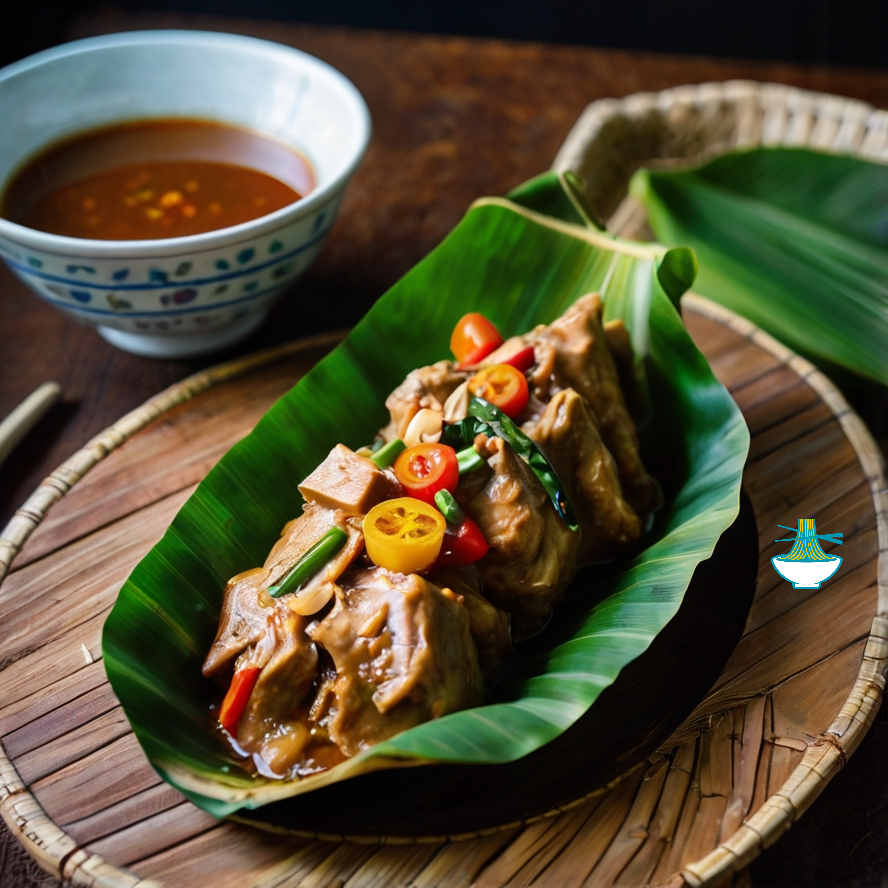Luwombo is a traditional African dish featuring meat , chicken , or fish cooked with vegetables in rich peanut sauce, then in banana leaves for a unique flavor.
Its origins date back centuries, reflecting the region's culinary heritage and cultural traditions.
Ingredients:
- Meat, chicken, or fish
- Assorted vegetables (such as carrots, potatoes, and cabbage)
- Peanut butter
- Onion
- Garlic
- Tomato
- Cooking oil
- Salt
- Banana leaves (for steaming)
Method:
1. Chop the meat, chicken, or fish into bite-sized pieces.
2. Prepare the vegetables by chopping them into small pieces.
3. In a large pot, heat cooking oil and sauté chopped onion and garlic until fragrant.
4. Add chopped tomato and cook until softened.
5. Stir in peanut butter and mix well to create a thick sauce.
6. Add the chopped meat, chicken, or fish to the pot and cook until browned.
7. Add the assorted vegetables to the pot and stir to combine.
8. Season with salt to taste.
9. Cut banana leaves into squares and briefly pass over an open flame to soften.
10. Place a portion of the meat and vegetable mixture onto each banana leaf square.
11. Wrap the banana leaves securely around the mixture to form parcels.
12. Steam the parcels in a steamer or large pot with a steaming rack for about 30-40 minutes until cooked through.
13. Serve the Luwombo parcels hot, unwrapping them at the table for a delightful presentation.
Nutrition Value:
1. Meat, Chicken, or Fish:
- Calories: Varies depending on the type and cut.
- Carbohydrates: Minimal, if any.
- Protein: High in protein.
- Fat: Contains varying amounts of fat, depending on the type and cut.
- Sodium: Low to moderate, depending on preparation.
- Cholesterol: Varies depending on the type and cut.
- Vitamins: Rich in B vitamins (especially B12), iron, and zinc.
- Minerals: Contains iron, zinc, and phosphorus.
- Nutritional Benefit: Provides essential amino acids for muscle growth and repair, along with important minerals like iron for oxygen transport in the body.
2. Assorted Vegetables (such as Carrots, Potatoes, and Cabbage):
- Calories: Low to moderate, depending on the type and quantity.
- Carbohydrates: Moderate, mainly from complex carbohydrates.
- Protein: Minimal.
- Fat: Minimal.
- Sodium: Low.
- Cholesterol: None.
- Vitamins: Rich in vitamins A, C, K, and various B vitamins.
- Minerals: Contains potassium, magnesium, and calcium.
- Nutritional Benefit: Provides essential vitamins, minerals, and dietary fiber for overall health, including support for immune function and digestion.
3. Peanut Butter:
- Calories: High due to its fat content.
- Carbohydrates: Moderate, with some fiber content.
- Protein: Moderate.
- Fat: High, primarily unsaturated fats.
- Sodium: Low to moderate, depending on brand and added salt.
- Cholesterol: None.
- Vitamins: Contains vitamin E and small amounts of B vitamins.
- Minerals: Rich in magnesium, phosphorus, and potassium.
- Nutritional Benefit: Good source of healthy fats, protein, and various vitamins and minerals, particularly beneficial for heart health and providing sustained energy.
4. Onion:
- Calories: Low.
- Carbohydrates: Low.
- Protein: Low.
- Fat: Low.
- Sodium: Low.
- Cholesterol: None.
- Vitamins: Contains vitamin C, vitamin B6, and folate.
- Minerals: Rich in potassium and manganese.
- Nutritional Benefit: Provides antioxidants, anti-inflammatory compounds, and prebiotic fibers that support digestive health and immune function.
5. Garlic:
- Calories: Low.
- Carbohydrates: Low.
- Protein: Low.
- Fat: Low.
- Sodium: Low.
- Cholesterol: None.
- Vitamins: Contains vitamin C, vitamin B6, and small amounts of other B vitamins.
- Minerals: Rich in manganese and contains small amounts of calcium, potassium, and phosphorus.
- Nutritional Benefit: Known for its potential immune-boosting and antimicrobial properties, garlic also contains antioxidants that may help reduce the risk of certain chronic diseases.
6. Tomato:
- Calories: Low.
- Carbohydrates: Low.
- Protein: Low.
- Fat: Low.
- Sodium: Low.
- Cholesterol: None.
- Vitamins: Excellent source of vitamin C, vitamin K, and vitamin A (in the form of beta-carotene).
- Minerals: Contains potassium and small amounts of other minerals like manganese.
- Nutritional Benefit: Rich in antioxidants like lycopene, which may help reduce the risk of certain cancers and promote heart health. Also provides essential vitamins for immune function and skin health.
7. Cooking Oil:
- Calories: High.
- Carbohydrates: None.
- Protein: None.
- Fat: High, mainly consisting of unsaturated fats (e.g., olive oil) or saturated fats (e.g., coconut oil).
- Sodium: None.
- Cholesterol: None.
- Vitamins: Depending on the type of oil, may contain vitamin E and vitamin K.
- Minerals: Minimal.
- Nutritional Benefit: Provides essential fatty acids necessary for proper cell function and absorption of fat-soluble vitamins. The type of oil used can impact heart health and overall nutritional value.
8. Salt:
- Calories: None.
- Carbohydrates: None.
- Protein: None.
- Fat: None.
- Sodium: High.
- Cholesterol: None.
- Vitamins: None.
- Minerals: Consists primarily of sodium and chloride.
- Nutritional Benefit: Essential for maintaining fluid balance, nerve function, and muscle contraction. However, excessive salt intake can contribute to high blood pressure and other health issues, so moderation is key.
9. Banana Leaves (for Steaming):
- Calories: Negligible.
- Carbohydrates: Negligible.
- Protein: Negligible.
- Fat: Negligible.
- Sodium: Negligible.
- Cholesterol: None.
- Vitamins: Minimal, if any.
- Minerals: Minimal, if any.
- Nutritional Benefit: While not consumed for nutritional value, banana leaves are used in cooking to impart a subtle, earthy flavor and aroma to dishes. They also serve as natural, eco-friendly packaging for steaming foods.


Comments